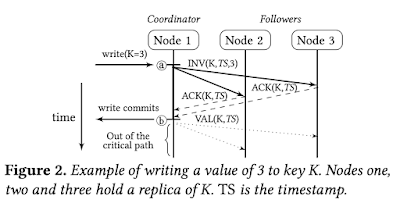Zoom Distributed Systems Reading Group
A couple days ago, I tweeted this out, and was surprised how well this was received. What would be your involvement level? The later options are inclusive of the earlier ones, so they involve more work. — Murat Demirbas (@muratdemirbas) March 23, 2020 The involvement level distribution looks healthy. One third wants to follow offline, one third likes to attend the discussion session live, and the remaining will get more involved in the reading group by doing their readings and some volunteering to present papers. We will start the Zoom DistSys Reading Group on Wednesday April 1st (no joke!) at 15:30 EST and meet regularly every week. We announce our meeting links (password protected) at https://join.slack.com/t/distsysreadinggroup/shared_invite/zt-lzcn7x42-R0eSDF4NVpAFTnhWaoLZ1Q Following a very brief presentation of the paper, we will start discussing the paper together. After we identify 4-5 interesting questions/directions to dig deeper, we will go into breakout sess...








